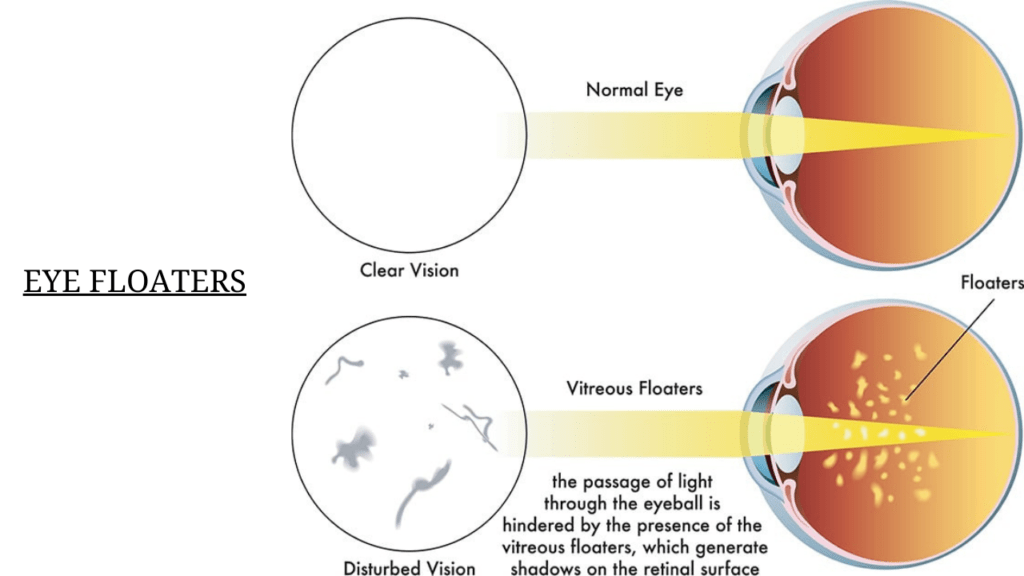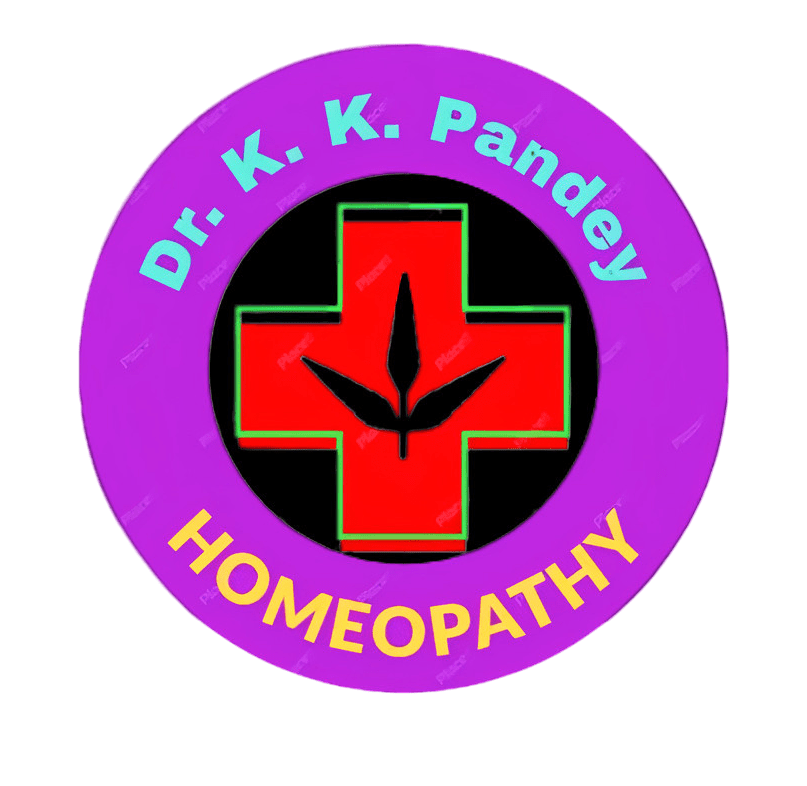
Dry Eye floaters are treated with homeopathic medicines easily. Eye floaters are small specks or strands that drift around in your field of vision.
Causes to develop Eye Floaters-
Table of Contents
About 80% of your eyes are filled with a gel-like substance called vitreous. When the vitreous gel shrinks it loses its natural round shape, and becomes fibrous, producing small shadows on the retina. These shadows are called eye floaters. These eye floaters eventually settle below your line of vision and may initially cause minor interference with vision.
In the case of an eye flash, the light entering your eyes, stimulates the retina of the eyes, resulting in an electrical impulse that is sent to the brain. The brain translates this incoming electrical impulse into light or an image. This is called photopsia or eye flash. And this can be short-term or long-term depending on the severity of the retinal damage.
Dry Eye Floaters
Dry eye floaters are visual disturbances characterized by small, shadowy shapes that appear to drift across the field of vision. These floaters result from insufficient moisture on the surface of the eye, leading to irritation and inflammation of the ocular tissues. When the tear film lacks adequate lubrication, the vitreous humor—a gel-like substance inside the eye—may cast shadows on the retina, causing the perception of floaters. Common symptoms of dry eye floaters include blurred vision, sensitivity to light, and a gritty or burning sensation in the eyes.
Various factors contribute to the development of dry eye floaters, including prolonged screen time, environmental conditions like dry air or wind, hormonal changes, certain medications, and underlying health conditions such as autoimmune disorders or allergies. Management of dry eye floaters typically involves addressing the underlying dry eye condition through lifestyle modifications, such as frequent breaks from screen use, using humidifiers, and staying hydrated. Additionally, artificial tear drops or lubricating eye ointments can help alleviate dryness and reduce the prominence of floaters. In more severe cases, prescription medications or procedures like punctal plugs to retain tears may be recommended by healthcare professionals.
What are the symptoms of eye flashes and eye floaters?
Following are some of the main symptoms of eye floaters and eye flashes: • You see small, web-like shapes in your vision as dark spots or floating clear strings. • A blemish or spots that seem to follow your gaze, and when you try to look closely, they quickly move out of your sight. • The blemish becomes more conspicuous against a simple, bright backdrop, like a blue sky or a white wall. • Small structures or threads gradually settle down and move out of the range of vision.
Homeopathic Remedies that may be used for Dry Eyes and Floaters:
Homeopathy is an alternative medicine system that stimulates the body’s healing processes. There are some homeopathic remedies that can cure eye floaters if used by practitioners carefully.
1. Physostigma: This remedy is often used for eye conditions and is believed to improve blurred vision and help with floaters. Physostigma is an effective remedy for addressing eye floaters, particularly in individuals with myopia (shortsightedness). The patient sees flashes of light before the eyes. A strong indication of pain after using the eyes is a prominent feature including floaters.
2. Silicea: Believed to aid in the repair of connective tissues, it might be suggested for a range of eye issues, including floaters.
3. Natrum Muriaticum: This remedy is often prescribed for conditions related to excess fluid in the body, and it may be suggested for floaters where a person sees zigzag lines before the eyes. A dimness of vision can be found in the patients of Natrum Muriaticum. Some people may also experience double vision. Natrum Mur is also beneficial in treating flickering sensations before the eyes accompanied by a headache. Zig-zag dazzling lines in the eyes, like lightning, followed by a headache (migraine) also indicates the use of this remedy.
4. Calcarea fluorica: This remedy is believed to strengthen tissues, including those in the eye, and may be used for floaters.
5. Causticum: It’s thought to help with various eye conditions, including floaters.
6. Phosphorus: This remedy may be recommended for visual disturbances and may be considered for floaters like “black spots”. Additionally, it is effective in instances where an individual experiences spots resembling flashes of light or red dots. This may be attended with diminishing sight. Looking at any bright, shining things causes worse the complaints. It is used for short-sightedness. If colored spots before the eyes are seen when a migraine attack will going to starts also indicates the use of Phosphorus.
7. Argentum Nitricum: Argentum Nitricum is a homeopathic remedy for eye floaters that resemble brown-colored spots. Intolerance to light in the eyes can be noticed. Weakness of sight along with grey spots in the eyes also indicate the use of Argentum Nitricum.
Who are at greater risk of eye flashes and eye floaters?
Some of the risk factors for developing eye floaters are:
• Being above 50 years of age
• myopia
• Eye injury
• diabetic retinopathy
• Swelling of the eye
• Complications from cataract surgery
Managing Eye Floaters: Diet and Lifestyle Tips-
Eye floaters are small, often harmless specks or strands that drift across your vision. They are typically caused by age-related changes in the jelly-like substance within your eyes, casting shadows on your retina. While floaters are generally benign, they can be bothersome. In addition to seeking medical advice, certain dietary and lifestyle adjustments can help manage them effectively.
Dietary Consideration
- Antioxidant-Rich Foods: Incorporate a variety of fruits and vegetables into your diet. These are packed with antioxidants that can help maintain eye health. Foods like, spinach, kale, carrots, berries, and oranges are particularly rich in antioxidants.
- Omega-3 Fatty Acids: Foods high in omega-3 fatty acids like salmon, mackerel, chia seeds, and walnuts may be beneficial. Omega-3s are known for their anti-inflammatory properties, which can support overall eye health.
- Stay Hydrated: Proper hydration is crucial for maintaining the overall health of your eyes. Aim to drink plenty of water throughout the day to help ensure your eyes receive the necessary nutrients.
- Limit Refined Sugars and Processed Foods: Diets high in refined sugars and processed foods can lead to inflammation and may contribute to eye health issues. Opt for whole, unprocessed foods whenever possible.
- Vitamin Supplements: Consult with your healthcare provider about the potential benefits of vitamin supplements, especially those rich in vitamins C and E, as well as nutrients like zinc and selenium.
Lifestyle Adjustments
- Regular Eye Exercise: Engage in regular eye exercises to promote healthy blood flow and reduce strain. Simple practices like palming, eye rolling, and focusing exercises can be beneficial.
- Proper Screen Usage: If you spend a significant amount of time looking at screens, follow the 20-20-20 rule. Every 20 minutes, look at something 20 feet away for at least 20 seconds to reduce eye strain.
- Manage Stress: Chronic stress can exacerbate eye floaters. Incorporate stress-relief practices like meditation, deep breathing, yoga, or nature walks into your routine. Shield your eyes from UV rays by wearing sunglasses that offer complete UVA and UVB protection whenever you’re outside. Prolonged exposure to UV radiation can contribute to eye health issues.
- Get Regular Eye Exams: Routine eye exams can help monitor the condition of your eyes and catch any potential issues early. Your eye care professional can provide personalized recommendations based on your specific situation.
- Maintain a Healthy Weight: Obesity and related conditions like diabetes can contribute to eye health problems. Adopting a balanced diet and regular exercise routine can help manage your weight and support overall eye health.
Conclusion
While eye floaters can be a natural part of aging, making certain dietary and lifestyle adjustments can help manage them effectively. Keep in mind that seeking guidance from a healthcare professional is essential for tailored advice. By incorporating these tips into your daily routine, you can support your overall eye health and minimize the impact of floaters on your vision.




[…] 10. Promotes Eye Health: […]